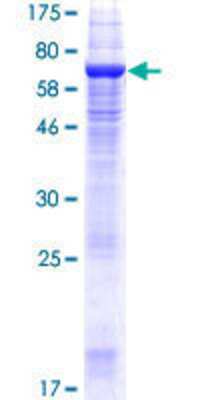Recombinant Human TMEM49 GST (N-Term) Protein
Novus Biologicals, part of Bio-Techne | Catalog # H00081671-P01

Key Product Details
Source
Tag
Conjugate
Applications
Product Specifications
Description
Source: Wheat Germ (in vitro)
Amino Acid Sequence: MAENGKNCDQRRVAMNKEHHNGNFTDPSSVNEKKRREREERQNIVLWRQPLITLQYFSLEILVILKEWTSKLWHRQSIVVSFLLLLAVLIATYYVEGVHQQYVQRIEKQFLLYAYWIGLGILSSVGLGTGLHTFLLYLGPHIASVTLAAYECNSVNFPEPPYPDQIICPDEEGTEGTISLWSIISKVRIEACMWGIGTAIGELPPYFMARAARLSGAEPDDEEYQEFEEMLEHAESAQDFASRAKLAVQKLVQKVGFFGILACASIPNPLFDLAGITCGHFLVPFWTFFGATLIGKAIIKMHIQKIFVIITFSKHIVEQMVAFIGAVPGIGPSLQKPFQEYLEAQRQKLHHKSEMGTPQGENWLSWMFEKLVVVMVCYFILSIINSMAQSYAKRIQQRLNSEEKTK
Purity
Predicted Molecular Mass
Disclaimer note: The observed molecular weight of the protein may vary from the listed predicted molecular weight due to post translational modifications, post translation cleavages, relative charges, and other experimental factors.
Activity
Protein / Peptide Type
Scientific Data Images for Recombinant Human TMEM49 GST (N-Term) Protein
Formulation, Preparation and Storage
H00081671-P01
| Preparation Method | in vitro wheat germ expression system |
| Formulation | 50 mM Tris-HCl, 10 mM reduced Glutathione, pH 8.0 in the elution buffer. |
| Preservative | No Preservative |
| Concentration | Please see the vial label for concentration. If unlisted please contact technical services. |
| Shipping | The product is shipped with dry ice or equivalent. Upon receipt, store it immediately at the temperature recommended below. |
| Stability & Storage | Store at -80C. Avoid freeze-thaw cycles. |
Background: TMEM49
TMEM49/VMP1 was first implicated in pancreatitis and its overexpression, together with KRAS oncogene activation, leads to development of pancreatic ductal adenocarcinoma (PDAC) (3). Aside from pancreatitis, TMEM49/VMP1 is also associated with a number of other pathologies including cancer, inflammatory bowel disease, and, potentially, neurodegenerative disorders such as Parkinson's Disease (PD) and Alzheimer's Disease (AD) (1). It is suggested that TMEM49/VMP1 deficiency in neurons results in disrupted autophagy and protein aggregation, increased ER-membrane contacts, and dysfunctional mitochondrial homeostasis, all of which contribute to neurodegeneration (1).
References
1. Wang, P., Kou, D., & Le, W. (2020). Roles of VMP1 in Autophagy and ER-Membrane Contact: Potential Implications in Neurodegenerative Disorders. Frontiers in molecular neuroscience, 13, 42. https://doi.org/10.3389/fnmol.2020.00042
2. Uniprot (Q96GC9)
3. Iovanna J. L. (2016). Autophagy Induced during Pancreatitis Promotes KRAS-Dependent Transformation in the Pancreas. Frontiers in oncology, 6, 226. https://doi.org/10.3389/fonc.2016.00226
Alternate Names
Gene Symbol
Additional TMEM49 Products
Product Documents for Recombinant Human TMEM49 GST (N-Term) Protein
Product Specific Notices for Recombinant Human TMEM49 GST (N-Term) Protein
This product is produced by and distributed for Abnova, a company based in Taiwan.
This product is for research use only and is not approved for use in humans or in clinical diagnosis. This product is guaranteed for 1 year from date of receipt.
